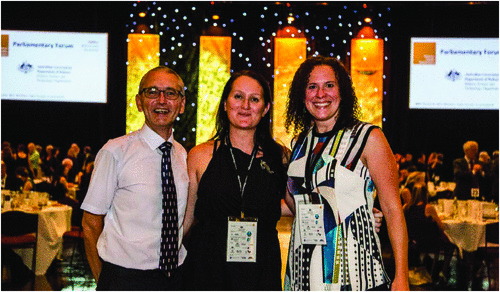Science meets Parliament 2015
Hayley J Newton A and Kate L Seib BA Department of Microbiology and Immunology at The Peter Doherty Institute for Infection and Immunity, University of Melbourne
B Institute for Glycomics, Griffith University
Microbiology Australia 36(3) 141-141 https://doi.org/10.1071/MA15048
Published: 11 August 2015
Science meets Parliament is an annual two-day event conducted by Science and Technology Australia (STA). This workshop brings approximately 200 Australian scientists, from all fields, to the Australian Parliament for a series of workshop and networking events that aim to unravel the mysteries of the parliamentary and policy-making process while also providing an opportunity to meet with the nation’s top parliamentarians and impress on them the importance of supporting scientific research.
The Australian Society for Microbiology was represented at Science meets Parliament 2015 by Dr Kate Seib and Dr Hayley Newton. This was the 15th Science meets Parliament and it was jam-packed with panel discussions, presentations and networking opportunities that allowed the scientific audience to come to terms with how different our world is from the world of politics.
Day one focused on developing skills for communicating science. There were multiple panel discussions from those involved in the media, policy making and lobbying parliament, discussing philosophical and operational obstacles that scientists must be aware of when communicating with politicians.
-
Ms Alison Carabine (Political Editor, ABC Radio National Breakfast) and Mr James Massola (Political Correspondent, Fairfax Media) gave an overview of ‘A day in the life of a journalist’ highlighting the tight time frames involved in the press world and what they need to turn our science into news.
-
Ms Jannette Cotterell (Managing Director, Executive Counsel Australia) and Mr Simon Banks (Managing Director, Hawker Britton) discussed ‘The art of the political meeting’, while Mr Martin Hoffman (Deputy Secretary, Science Group, Department of Industry and Science) talked about ‘The messy nature of the policymaking process’.
-
Professor Graham Durant AM (Director, Questacon) asked us ‘Who is Inspiring Australia?’ and talked about Questacon’s initiatives to bring scientific achievement into the public eye.
-
Professor Brian Schmidt AC (Nobel Laureate and ARC Laureate Fellow, ANU) and Professor Hugh White AO (Professor of Strategic Studies, ANU) reflected on their own experiences in a session on ‘How to talk/think like a policymaker’.
-
Dr Rod Lamberts and Dr Will Grant (Centre for the Public Awareness of Science, ANU) concluded the day with an interactive session on how to pitch your research in two-minute presentations aimed at ‘Getting your science out of the lab’.
Day one concluded with a Gala dinner in the Great Hall at Parliament House. Many MPs attended the event where we heard from Ms Catherine Livingstone AO, President Business Council of Australia, about issues including the importance of knowledge infrastructure and STEM education. The Hon Ian Macfarlane, Minister for Industry and Science, discussed the importance of science in our lives on a day-to-day basis, and to our national prosperity. He also highlighted Australia’s poor performance in terms of collaboration between business and research organisations, and the need to work together across disciplines and sectors to translate research into goods and services, new technologies and life improvements. Similarly, the Hon Bill Shorten, Leader of the Opposition, discussed the importance of developing a National STEM Strategy and his view that it is time to make science a national political priority.
Among the diverse events of Day two was lunch at the National Press Club with an address from Australia’s Chief Scientist Professor Ian Chubb. Professor Chubb reflected on his time in this position and talked of his vision for the future of Australia whereby science education was prioritised in schools not only to nurture curiosity but also to develop a much higher societal scientific literacy. Professor Chubb stressed the notion that science is not only valuable but has quantifiable value as demonstrated by his release of a report quantifying the huge contribution of physics, chemistry, earth science and mathematical sciences to our economy over the past 20 years. He also reminded his scientific audience to be consistently relentless in our scientific pursuits and stressed the importance of the ‘3 P’s’: Passion, Patience and Persistence.
Day two also included meetings between scientists and parliamentarians at Parliament House. Hayley met with the Shadow Minister for Agriculture and Rural Affairs and Federal Member for Hunter, Joel Fitzgibbon. They discussed the impact of microbiological pathogens in the agriculture setting and the importance of understanding these animal and sometimes-human pathogens that threaten our important farming industry as well as our native wildlife. Mr Fitzgibbon, as a former Minister for Defense, also expressed a keen interest in opinions of microbiologists in our biosecurity policies. Mr Fitzgibbon holds a genuine appreciation and interest in science and acknowledges the vital role science plays in our society. Kate met with the Federal Member for La Trobe, Jason Wood, and discussed the growing problem of antibiotic resistant bacteria and the need for an increased focus on vaccine development for several infectious diseases. Mr Wood also outlined some of the environmental issues in his electorate that he was interested in, including weed and pest management.
Attending question time in the House of Representatives during the final afternoon was an interesting experience. From a scientist’s perspective it is hard to understand how this process is particularly productive.
Overall, the two-day program provided the scientists involved with new insights into the workings of another ‘3 P’s’ – Parliament, Politicians and the Press. Hopefully, the politicians involved also gained an increased understanding of science and its benefits to the community as a whole.

|


